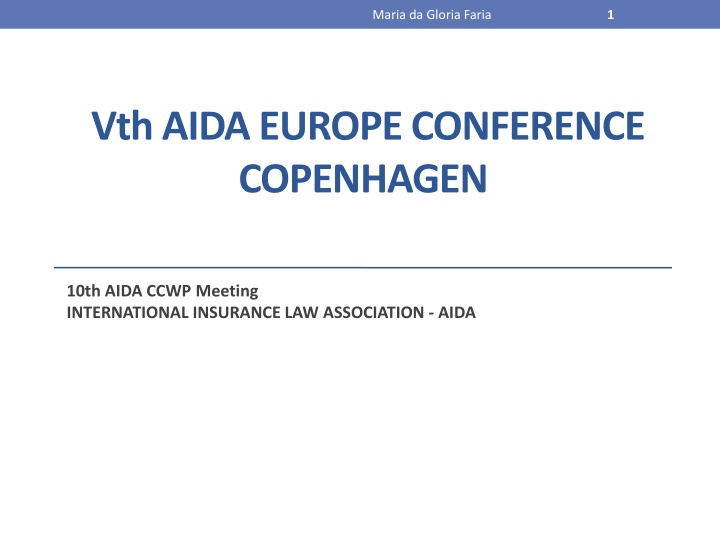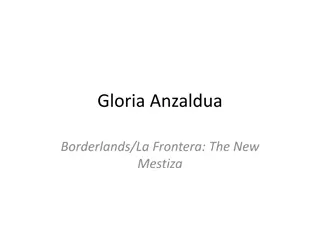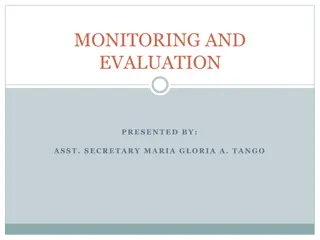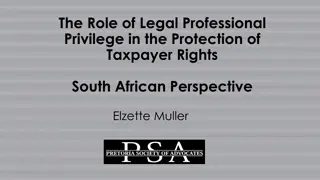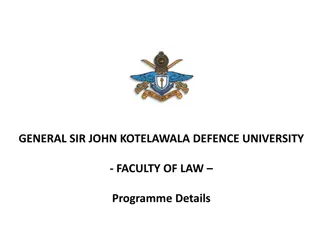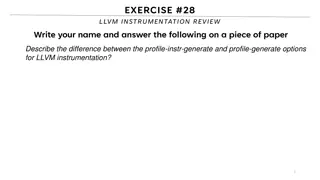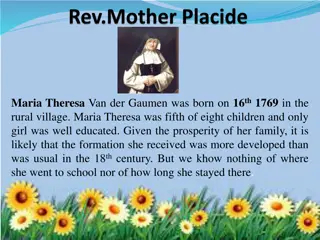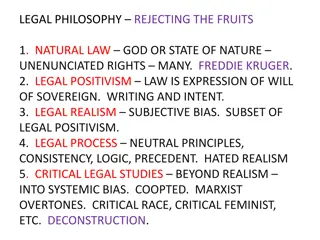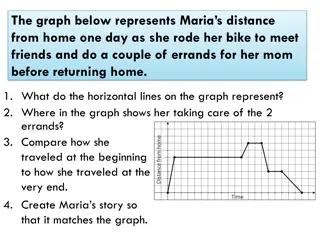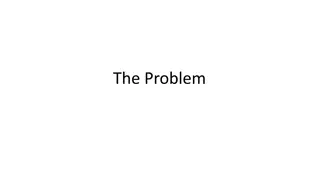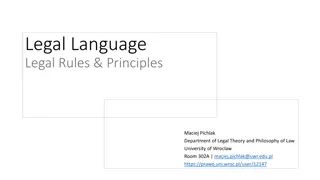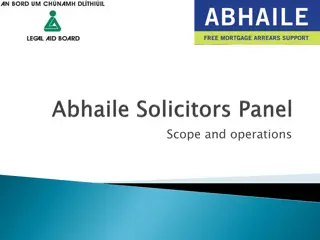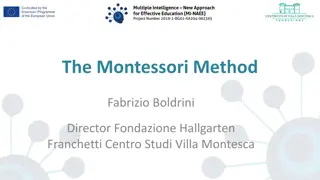Maria da Gloria Faria - Professional Profile and Legal Expertise
Maria da Gloria Faria is a prominent lawyer with a background in insurance law and environmental law. She holds various qualifications and positions in national and international legal associations, showcasing her expertise and contributions to the legal field. Faria's work focuses on subjects such as insurance contracts, environmental insurance, and waste management, demonstrating her commitment to legal practice and sustainability.
Download Presentation

Please find below an Image/Link to download the presentation.
The content on the website is provided AS IS for your information and personal use only. It may not be sold, licensed, or shared on other websites without obtaining consent from the author.If you encounter any issues during the download, it is possible that the publisher has removed the file from their server.
You are allowed to download the files provided on this website for personal or commercial use, subject to the condition that they are used lawfully. All files are the property of their respective owners.
The content on the website is provided AS IS for your information and personal use only. It may not be sold, licensed, or shared on other websites without obtaining consent from the author.
E N D
Presentation Transcript
Maria da Gloria Faria 1 VthAIDA EUROPE CONFERENCE COPENHAGEN 10th AIDA CCWP Meeting INTERNATIONAL INSURANCE LAW ASSOCIATION - AIDA
Maria da Gloria Faria 2 CLIMATE CHANGE WORKING PARTY MANDATORY WASTE MANAGEMENT IN THE INSURANCE SECTOR: PERSPECTIVES AND LEGISLATURE SCENE SALVAGE WASTE MANAGEMENT AS SUSTAINABILITY PRACTICE
Maria da Gloria Faria 3 AIDA/Brazil AIDA/Brazil MARIA DA GLORIA FARIA Lawyer, graduated from Rio de Janeiro State University - UERJ, with a Masters Degree on Corporate Law from C ndido Mendes University with a Certification on College Didacticism, IAG Master on Insurance from PUC-RJ, Specialist on Social Security from UERJ, member of the Board of Appeals of the National System of Private Insurance CRSNSP - period 2009/2013, Surrogate member of the Administrative Board of Fiscal Appeals - CARF since3 2010, Vice President of the International Insurance Law Association AIDA Brazil and Legal Superintendent at the National Confederation of Insurance, Private Life and Pension Funds, Supplementary Health and Capitalization Company (CNSeg/Fenaseg). PERY SARAIVA NETO PhD student of Law at/PUCRS, with a Master s Degree in Law from UFSC and Specialist on Environmental Law from FUNJAB/UFSC. Professor (Graduation and Post-Graduation). Guest Professor at UFRGS, FGV/Rio, ESMESC, ESA/OAB, UNIDAVI, UNIVALI e UNOESC. Member of the Research Group on Environmental Law and Political Ecology in a Risk Society /UFSC. Cultural Vice-President at the International Insurance Law Association AIDA/BRAZIL. President of the National Task-Force on Environmental Insurance at AIDA/BRASIL. General- Secretary of the Insurance Law Committee at OAB/SC. Former member of the Environment Committee at OAB/SC (2008/2010). Author and Collaborator in books and articles such as Evidence in the Environmental Jurisdiction (Livraria do Advogado/2010), Legal Aspects of Insurance Contracts (Livraria do Advogado/2013), Legal Aspects of Insurance Contracts Year II (Livraria do Advogado/2014) and Legal Aspects of Insurance Contracts Year III (Livraria do Advogado/2015). Lawyer and Legal Consultant. GLAUCE CARVALHAL Lawyer with Degree from Rio de Janeiro Federal University - UFRJ, with Post-Graduation Degree on Constitutional Civil Law from Rio de Janeiro State University - UERJ, with Specialization on Insurance and Reinsurance Law from Funda o Get lio Vargas, Legal Manager at the National Confederation of Insurance, Private Life and Pension Funds, Supplementary Health and Capitalization companies (CNSeg/Fenaseg).
4 Maria da Gloria Faria BRAZILIAN SCENE Registered Fleet with Denatran*: 81 million vehicles Vehicles Robbery and Theft: 416 thousand vehicles in 2014 Recovered Vehicles: approx.. 50% Obs.: 30 million vehicles with 5 or more years of use**. * ** Traffic National Department
5 Maria da Gloria Faria BRAZILIAN SCENE 2 million Estimated amount of vehicles apprehended due to irregularities or tax debts to the State.
6 Maria da Gloria Faria BRAZILIAN SCENE Most robbed or stolen vehicles have as destination clandestine disassembling yards.
7 Maria da Gloria Faria BRAZILIAN SCENE 1,3 million vehicles in Yards Public Yards: DETRAN s, Road Police, Civil Police and Military Police; Private Yards.
8 Maria da Gloria Faria CONSEQUENCES Constant production of replacing and repair parts competing with those produced for the assembling of new vehicles and the subsequent deficit that adds up to the increase in waiting time at the repair shops; Improper destination of tires, lubricants, oils, batteries, waste and scrap, all natural environment contaminants.
9 Maria da Gloria Faria TROUBLES FOR THE INSURANCE SECTOR R$ 18 billion collection in class 31 16 million of insured vehicles = 25% of the fleet 80% of brand new vehicles are insured 4% of vehicle s price is the insurance average premium for brand new vehicles 5% of vehicles with 7 or more years of use are insured Insurance of a vehicle with 7 years of use may cost up to 20% of its value.
10 Maria da Gloria Faria Cost of original bumper + hood of a popular vehicle R$ 900,00 (US$ 300) Cost of the same parts - recycled R$ 350,00 (US$ 117) Actual market of recycling cooperatives 124 mapped cooperatives
11 Maria da Gloria Faria NEW LAW forSOLID WASTE Law # 12.305 of August 2nd, 2010, disposes of Public Policy on solid wastes. Not the first nor the only Brazilian Law on wastes, but it s the one that has laid out the legal framework of the sector with the creation of an articulated system among Union, States, Municipalities, Private Initiative and Society.
12 Maria da Gloria Faria LAW # 12.305, of AUGUST 2ND, 2010 OBJETIVES and PURPOSES NON GENERATION REDUCTION REUSE RECYCLING TREATMENT OF SOLID WASTES AND ENVIRONMENTALLY FIT FINAL DESTINATION OF THE WASTES REVERSE LOGISTICS
13 Maria da Gloria Faria LAW # 12.305, of AUGUST 2ND, 2010 Implementation of the National Policy on Solid Waste, focused on: Sustainable Production and Use; Reduction of Environmental Impacts; Generation of Labor, Work and Income; and Environmental Education.
14 Maria da Gloria Faria Concepts adopted by Law # 2.305/2010 Art. 3rd- For the effectiveness of this Law, it s understood that: I Sector Agreement: an agreement by and among the public power and manufacturers, importers, distributors or businesspeople, aiming the implementation of joint responsibility through the lifespan of a product; II contaminated area: location where there is contamination caused by the disposal, regular or irregular, of any substances or wastes; III orphan contaminated area: contaminated area under the responsibility of unidentified or unidentifiable persons; IV product s lifespan: phases that contain the development of the product, the gathering of raw materials, production, use and final disposal; V selective collection: collection of solid wastes previously organized according to their composition; VI social control set of mechanisms and procedures that grant society information and participation in establishing, implementing and assessment of public policies regarding solid wastes;
15 Maria da Gloria Faria Concepts adopted by Law # 2.305/2010 VII environmentally proper final destination: wastes destination which includes reuse, recycling, composting, recovery and energetic use or other destinations admitted by the competent departments of Sisnama, of SNVS and of Suasa, among them final disposal under specific operations norms in order to avoid damages or risk to public health and safety and to minimize adverse environmental impacts; VIII - environmentally proper final destination: wastes proper distribution in landfills, observing specific operations norms in order to avoid damages or risk to public health and safety and to minimize adverse environmental impacts; IX solid wastes generators: personal or corporate entities, public or private, which generate solid wastes through their activities, consumption included; X management of solid wastes: set of actions applied, direct or indirectly, to the collection, transportation, transshipment, treatment and environmentally proper final destination of the wastes, in accordance with the municipal plan for integrated management of solid wastes or with the solid wastes management plan, in accordance with this law; XI solid wastes integrated management: set of actions concerning the search for solutions for solid wastes, taking into consideration the political, economic, environmental, cultural and social dimensions, under social control and sustainable development;
16 Maria da Gloria Faria Concepts adopted by Law # 2.305/2010 Art. 3rd- For the effectiveness of this Law, it s understood that: XII reverse logistics : a tool for economic and social development characterized by a set of actions, procedures and means destined to make possible the collection and the return of solid wastes to the corporate sector for reuse, in its productive cycles or another final environmentally proper final destination; Art. 33. Are forced to structure and implement systems of reverse logistics, through the returning of products after their use by consumers, regardless of the public service of urban cleaning and handling of solid wastes, manufacturers, importers, distributors and business people (...)
17 Maria da Gloria Faria Concepts adopted by Law # 2.305/2010 XVI solid wastes: discarded material, substance, object or good as result of human activities in society, whose final destination is, will be or is required to be carried out, in solid or semisolid state, as well as gases in recipients or liquids whose specificities make them improper to be discarded in the public swage systems or in water bodies, or that demand non-practicable technical or economical solutions according to the best available technology;
18 Maria da Gloria Faria LAW #12.305, OF AUGUST 2ND, 2010 NATIONAL POLICY OF SOLID WASTES OBJECTIVES Art. 7 - Objectives of National Policy on Solid Wastes: I protection of public health and environment quality II non generation, reduction, reuse, recycling and treatment of solid wastes, as well as proper environmental final disposal of wastes; VI incentive to the recycling industry to increase the use of raw materials and inputs from recycled material; VII joint management of solid wastes;
19 Maria da Gloria Faria LAW # 12.305 of 2010 NATIONAL POLICY OF SOLID WASTES OBJECTIVES (continuation) VIII good relatioships within different areas of public powers, and those with the private area, aiming technical and financial cooperation for the joint management of solid wastes; ............................................................................................................................................... XIII incentives to the implementation of products lifespan assessment (important for the assessment of the renewal of vehicle fleet)
20 Maria da Gloria Faria LAW # 12.305 of 2010 NATIONAL POLICY OF SOLID WASTES INSTRUMENTS Art. 8o Are instruments of the National Policy on Solid Wastes, among others: I - plans of solid wastes; II inventories and solid wastes yearly statements; XI National system of information on the management of solid wastes (Sinir); XV the National Registry of Dangerous Wastes;
21 Maria da Gloria Faria Law# 12.305 of 2010 MANAGEMENT PLAN REACH Art. 20. are subject to the formulation of a solid wastes management plan: I generators of solid wastes set on e , f , g e k of insert I art. 13*(generated by public services of basic sanitation, generated by industrial procedures, by health services and mining) II commerce shops and service providers that: a) generate dangerous wastes; b) generate wastes which, even if classified as non-dangerous by their nature, composition or volume, are not comparable by the municipality with home wastes; III civil constructing companies, under the terms and regulations established by Sisnama; IV responsible for terminals and other installations referred to in I of art. 13 and under the terms and regulations of Sisnama and, if applicable, transportations companies;
22 Maria da Gloria Faria Law# 12.305 of 2010 Chapter III - RESPONSIBILITIES OF GENERATORS AND THE PUBLIC POWER Art. 25. The public power, the commercial sector, and the people in general are responsible for the effectiveness of actions taken to ensure the conformity with the National Policy for Solid Wastes and the regulations and decisions set forth in this law. ................................................................................................................................................. ...... Art. 27. Individuals or corporate entities referred to in art. 20 are responsible for the full implementation and operation of the Solid Wastes Management Plan approved by the competent department in accordance with art. 24. 1o The hiring of services of collection, storing transporting, transshipping, treatment or final disposal of solid wastes, or final disposal of rejects does not exempt individuals or corporate entities referred to in art. 20 from the responsibility for damages that may be caused by improper management of their respective wastes of rejects.
23 Maria da Gloria Faria Legislature History DISASSEMBLING 2014 S o Paulo state law # 15.276 dated January 2nd, 2014 establishes the destination of vehicles at the end of their lifespan and other dispositions. Decree (SP) # 60.150, dated February 13th, 2014 Regulates Law # 15.276 ( ) 2014 Federal Law # 12.977, dated May 20th, 2014 disposes of the activity of disassembling of vehicles; amends art. 126 of law # 9.503 of September 23rd, 1997 Brazilian Traffic Law; and other dispositions.
24 Maria da Gloria Faria CHALENGES TO THE INSURANCE MARKET Solid Wastes Management set of actions applied, direct or indirectly, in the collection, transportation, transshipment, treatment and environmentally proper final destination of the wastes, in accordance with the municipal plan for integrated management of solid wastes or with the solid wastes management plan.
25 Maria da Gloria Faria FACTORS OF SUCCESS FACTORS OF SUCCESS VEHICLE MAINTENANCE At legal and specialized mechanic shops vehicles shall have adequate check up according to the following steps: Removal and treatment of fluids (oil, coolant, etc.) Disassemble Storage of parts to be reused Parts to be sent to recycling Reuse of parts in perfect conditions Obs: all collection and maintenance stations must be approved/authorized to start their activities.
26 Maria da Gloria Faria CHALLENGES TO THE INSURANCE MARKET LAW ENFORCEMENT JOINT RESPONSIBILITY SOLIDARITY IN PREVENTION, CARE AND WASTE MANAGEMENT
27 Maria da Gloria Faria CHALLENGES TO THE INSURANCE MARKET Management of Solid Wastes Set of actions applied, direct or indirectly, during collection, transport, transshipment, treatment or environmental proper final disposal of solid wastes and environmental proper final disposal of rejects, in accordance with the solid wastes joint management municipal plan or with the solid wastes management plan.
28 Maria da Gloria Faria Shared Responsibility for products life span holders of public services, urban cleaning and solid waste management consumers consumers manufacturers manufacturers Distributors Distributors and business people business people and importers importers
29 Maria da Gloria Faria REVERSE LOGISTICS JOINT RESPONSIBILITY Set of individual and joint responsibilities of manufacturers, importers, distributors and businessmen, consumers and those in charge of urban cleaning services and transport of solid wastes, to minimize the amount of solid wastes generated, as well as to reduce impacts caused to human health and to the environment quality resulting from products lifespan, under the articles of this law.
30 Maria da Gloria Faria ADVANTAGES PUBLIC SAFETY Reduction in theft of vehicles Reduction in violence levels, specially in large urban centers Lowering crime by the disincentive of illicit associations
31 Maria da Gloria Faria EXPECTED BENEFITS EXPECTED BENEFITS Reduction in theft of vehicles Reduction of commerce of illegal parts Reduction in urban violence Disincentive to illicit associations
32 Maria da Gloria Faria ADVANTAGES ENVIRONMENT reduction of environment pollution through proper disposal of fluids and dangerous components (batteries, lubricants, oils, glasses and others) Proper disposal of wastes and parts not used in the process Economy of raw material Economy of electric power Economy of water
33 Maria da Gloria Faria EXPECTED BENEFITS EXPECTED BENEFITS Environment Environment Reduction of environmental pollution through the elimination and disposal of components considered dangerous, such as batteries, fluids, as well as the neutralization of flammable elements (air-bags and belt holders). Reduction of the fleet (a new fleet is less affected by defects).
34 Maria da Gloria Faria ADVANTAGES ECONOMIC ORDER Supplying the market with reusable parts bearing certified origin, safety reliability and low prices More than 40 million car owners potential buyers Jobs generation at the recycling chain and other indirect chains Increase in tax collection due to a formal services market.
35 Maria da Gloria Faria ADVANTAGES HEALTH No soil contamination close to dams, water fountains and water tables. Less gas emission due to better vehicle maintenance and subsequent fewer respiratory allergies Fewer vehicles in scrapyards and less concentration of standing waters resulting in fewer illnesses, specially dengue.
36 Maria da Gloria Faria EXPECTED BENEFITS EXPECTED BENEFITS Health Mitigation of dengue and other illnesses at places with large concentration of vehicles in scrapyards. No soil contamination close to dams, water fountains and water tables. Better air quality in large centers and fewer respiratory illnesses affecting people.
37 Maria da Gloria Faria EXPECTED BENEFITS EXPECTED BENEFITS Traffic Less air pollution, newer and safer automobiles and checked used cars on the streets. Fewer vehicles stopped on streets for lack of maintenance Reduction in the number of car accidents due to lack of maintenance Fewer traffic jams / shorter travelling time.
38 Maria da Gloria Faria MARIA DA GLORIA FARIA and GLAUCE CARVALHAL www.cnseg.org.br juridico@cnseg.org.br PERY SARAIVA NETO www.perysaraivaneto.com.br contato@perysaraivaneto.com.br
39 Maria da Gloria Faria THANK YOU!!!
